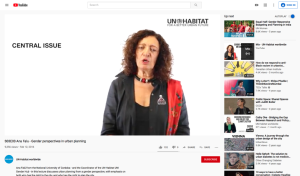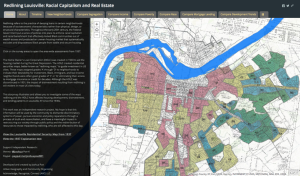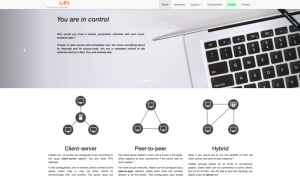Theme: Urban and Regional Planning
Back to Top
|
 |
|
 |
|
Gender perspectives in urban planning
|
Social studies |
|
Launched in 2014, the UN-Habitat's Global Urban Lectures series provides open-access discussions on "cities and urbanization," for academics and the general public. Ana Falu leads this talk, "Gender perspectives in urban planning," which focuses on "gender omission" in traditional planning processes. Falu is an architect, professor, and researcher at the National University of Cordoba and the Coordinator of the UN-Habitat UNI Gender Hub. Her lecture opens by noting that "women are omitted or have little participation in decision-making related to cities, housing, and planning decisions." In the remaining 14 minutes, she considers accessibility and equality, presenting both problems and proposed solutions. At the link above, readers can access a YouTube recording of the talk (originally aired in 2016). To view additional readings and resources for Falu's talk, as well as other lectures from UN-Habitat, visit the Global Urban Lectures section of the UN-Habitat website (following the URL included in the video description). For easy browsing, lectures can be sorted by Theme (including: environment, planning and design, and social inclusion). [EMB] |
|





|
|
 |
|
Redlining Louisville: Racial Capitalism and Real Estate
|
Social studies |
|
What is the relationship between racism and real estate? The association is shaped, in part, by redlining, "the practice of denying loans in certain neighborhoods because of socioeconomic characteristics rather than physical, design, or structural characteristics." Inspired by his time as an urban planning graduate student at the University of Louisville, Joshua Poe created this story map to explore redlining's impact in Louisville, Kentucky. He relied on historical data from Home Owner's Loan Corporation (HOLC) maps and 2010 Census data to craft the project. The About and Timeline tabs provide useful background information before diving into the data. As the About section explains, housing values were based largely on the racial and socioeconomic makeup of a neighborhood, leading to "systemic devaluation and disinvestment," in majority-minority communities. The resulting housing segregation is made visible by this project's sub-sections. Several points of comparison (including race and socioeconomic status) are highlighted at the top of the page, and the menu button in the right-corner provides other sorting options (e.g. "Compare Property Values" and "Compare Zoning"). Additionally, the map key (found in the pop-up box in the left-hand corner) will help users understand the data. [EMB] |
|





|
|
 |
|
Urban Planning
|
Social studies |
|
Urban Planning provides those with an academic interest in the field open-access to peer-reviewed research. Relatively new to the academic publishing scene, the journal is committed to "advancing understandings and ideas of humankind's habitats," and hopes "to promote progress and quality of life." Under the Archives tab readers can browse the more than 25 issues released from 2016 to the present. A core theme centers each issue. For example, Volume 1, Issue 3 focuses on "Sustainable Planning and Technologies," and Volume 5, Issue 3 is titled "Cities of Inclusion: Spaces of Justice." Readers should stay tuned for upcoming issues, including Volume 5, Issue 4, "The City of Digital Social Innovators" (scheduled for release in winter 2020). The Next Issues tab has more information, including a release schedule. Readers interested in submitting a manuscript will find instructions on the For Authors page. The journal is led by Editors-in-Chief Luca D'Acci (Polytechnic of Turin, Italy), Andrew Hudson-Smith (University College London, UK), and Steffen Lehmann (University of Nevada, USA). [EMB] |
|





|
|
 |
|
On the Land
|
Social studies |
|
Westernized discussions of land planning are often disingenuous to the Indigenous voices and experiences that protected "the land despite generations of attempted and forced genocide, removal, and assimilation." On the Land re-centers these voices and stories. The podcast is a project of Deenaalee ("a Deg Xit'an Athabaskan and Supiaq womxn," whose pursuits include podcast production, public policy advocacy, and protection of natural resources), and Micheli Oliver (a "descendent from the Niitisapi (Blackfeet) people," who uses her photography talents as a vessel for "decolonization and social justice [and] Indigenous sovereign rights,"). So far, On the Land has released its inaugural season, Xilegg: Our Arctic Presence, which uplifts "the voices of Indigenous people from throughout the Arctic," and hopes to inspire "non-Indigenous scientists, policy makers, allies, government officials, and citizens from the north and beyond," to follow the advice of "Indigenous Knowledge holders who are our Experts." Listeners should begin with the Xilegg trailer, a short introduction to the season and its focus, before diving into the episodes. Each episode presents an in-depth discussion, ranging from forty to eighty minutes, on topics including community care and land and climate justice. Though the show went on a brief hiatus over the summer, episodes are back and will be released monthly moving forward. In addition to the podcast, the website highlights several other resources (for example, the Toolkit/Shownotes section links to readings, multimedia projects, and advocacy tools). Listeners should check back soon for updates to the Glossary and Syllabus sections. [EMB] |
|





|
|



















